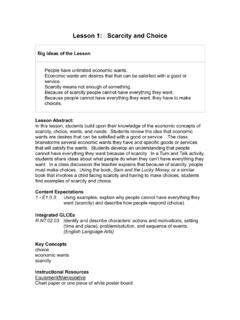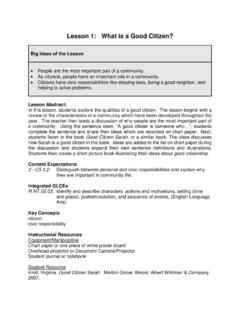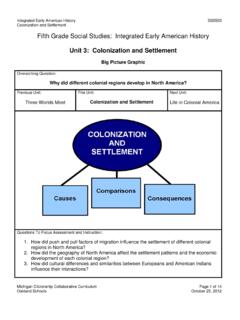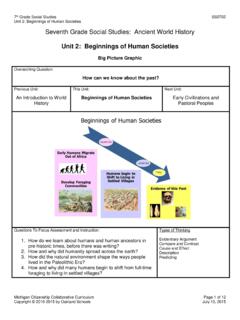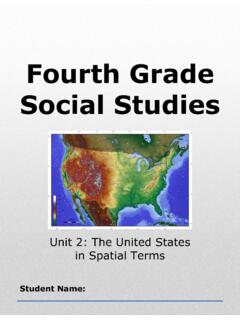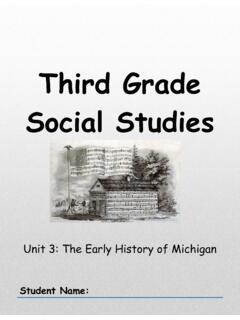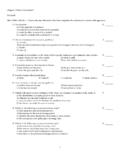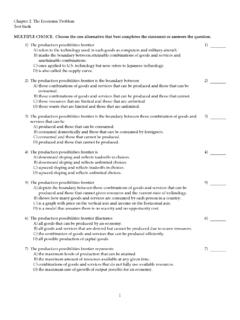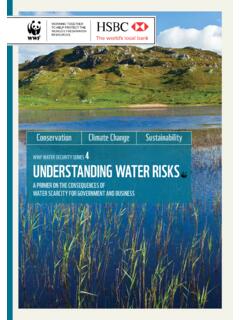Transcription of Fourth Grade Social Studies - Weebly
1 Fourth Grade Social Studies Unit 1: Foundations in Social Studies Student Name: 4th Grade Michigan Studies Unit 1: Foundations in Social Studies Michigan Citizenship Collaborative Curriculum Page 1 of 32 Big Picture Graphic Overarching Question: What types of lenses do Social scientists use in investigating places and people? Previous Unit: Third Grade Michigan Studies This Unit: Foundations in Social Studies Next Unit: The United States in Spatial Terms Questions To Focus Assessment and Instruction: 1. What questions frame the Social Studies disciplines of history, geography, government, and economics? 2. How are historians, geographers, political scientists, and economists similar and different in how they study people and places?
2 Types of Thinking Compare and Contrast Identifying Perspectives 4th Grade Michigan Studies Unit 1: Foundations in Social Studies Michigan Citizenship Collaborative Curriculum Page 2 of 32 Questions for Students In this unit, we are going to be learning about foundations in Social Studies . Think about the focus questions: Use the chart below to write or draw about these questions. Things I Know Questions I Have 1. What questions frame the Social Studies disciplines of history, geography, government, and economics? 2. How are historians, geographers, political scientists, and economists similar and different in how they study people and places? 4th Grade Michigan Studies Unit 1: Foundations in Social Studies Michigan Citizenship Collaborative Curriculum Page 3 of 32 Lesson 1 Graphic Organizer What happened?
3 Primary Sources Secondary Sources The Questions Historians Ask Timelines Chronological Order When did it happen? Effects Causes How and why did it happen? Point of View Actions and Feelings Who was involved? 4th Grade Michigan Studies Unit 1: Foundations in Social Studies Michigan Citizenship Collaborative Curriculum Page 4 of 32 Word Cards 1 history the study of the past Example: When you study history you study about people and events of the past. 2 historian a person who Studies the past Example: A historian Studies clues from the past. 3 evidence proof that something happened Example: Historians look for evidence of what happened in the past. 4 primary sources records made by people who saw or took place in an event Example: Photographs, diaries, newspaper articles and letters are primary sources.
4 Big Ideas of Lesson 1, Unit 1 History is the study of the past and historians are people who study the past. Historians study the past by trying to answer certain questions. The questions of history are: What happened? When did it happen? Who was involved? How and why did it happen? Historians study primary and secondary sources to try and answer the questions of history. The questions of history can be used to help us review the history of Michigan. 4th Grade Michigan Studies Unit 1: Foundations in Social Studies Michigan Citizenship Collaborative Curriculum Page 5 of 32 5 secondary sources records written by someone who was not there at the time of the event Example: Textbooks are secondary sources.
5 6 chronological order time sequence Example: He put the events in Michigan history in chronological order. 7 timeline a diagram that shows the order in which events happened Example: You can make a timeline of important events in your life. 8 point of view how a person looks at a problem or an event Example: People can have different points of view because their ages or backgrounds are different. 9 cause an action that makes something else happen Example: One cause of population growth in Michigan was the opening of the Erie Canal. 10 effect something that results from something else happening Example: One effect of the fur trade in Michigan was that American Indians and the French began to interact.
6 1900 1950 2000 1998 2000 2005 Cause Event Effect Cause Event Effect 4th Grade Michigan Studies Unit 1: Foundations in Social Studies Michigan Citizenship Collaborative Curriculum Page 6 of 32 Mystery Source #1 4th Grade Michigan Studies Unit 1: Foundations in Social Studies Michigan Citizenship Collaborative Curriculum Page 7 of 32 Mystery Source #2 Analysis Sheet Partners: _____ and _____ What kind of a document is this? Who do you think wrote this? On what evidence did you base your answer? When do you think it was written? On what evidence did you base your answer? What is being described? What is an example of the writer s feelings? What is the point of view of the writer?
7 What does this source tell us about early Michigan history? 4th Grade Michigan Studies Unit 1: Foundations in Social Studies Michigan Citizenship Collaborative Curriculum Page 8 of 32 Chronology for Michigan History Now 50 years ago - 1950 100 years ago - 1900 200 years ago - 1800 300 years ago - 1700 150 years ago - 1850 4th Grade Michigan Studies Unit 1: Foundations in Social Studies Michigan Citizenship Collaborative Curriculum Page 9 of 32 Lesson 2 Graphic Organizer 4th Grade Michigan Studies Unit 1: Foundations in Social Studies Michigan Citizenship Collaborative Curriculum Page 10 of 32 Word Cards 11 geography the study of the Earth and the way people interact with the Earth Example.
8 When you study geography you learn about different places. 12 the five themes of geography five big ideas that help people understand geography Example: Location is one of the five themes of geography. 13 location the geographic theme that answers the question Where is it? Example: Maps can be used to find out the location of a place. 14 place the geographic theme that answers the question What is it like there? Example: Geographers use the theme of place to describe what an area is like. Big Ideas of Lesson 2, Unit 1 Geography is the study of the Earth and the ways in which people interact with the Earth. Geographers use five themes to organize the kinds of questions they ask.
9 The five themes are: location, place, human/environment interactions, movement, and region. Some examples of questions geographers ask include: Where is the place located? What is the place like? How do people interact with the environment? How is the place connected with other places? and How might common geographic characteristics help understand this place? 4th Grade Michigan Studies Unit 1: Foundations in Social Studies Michigan Citizenship Collaborative Curriculum Page 11 of 32 15 physical characteristics geographic features that were not made by humans Example: Lakes, rivers, and mountains are natural features. 16 human characteristics geographic features that were made by people Example: Roads, bridges, and cities are human features.
10 17 human/environment interaction ways in which people use, adapt, or modify with the Earth. Example: When people build new roads they are interacting with the Earth. 18 movement the geographic theme that explains how and why people, goods, and ideas move Example: The theme of movement helps us understand how places are connected to other places. 19 region an area with one or more common features Example: The Upper Peninsula can be one region of Michigan. 4th Grade Michigan Studies Unit 1: Foundations in Social Studies Michigan Citizenship Collaborative Curriculum Page 12 of 32 Questions Geographers Ask Theme Questions Location Where is it? What is its absolute location?
